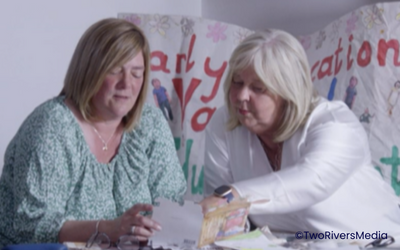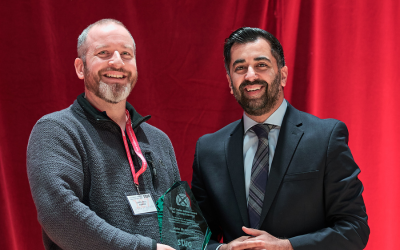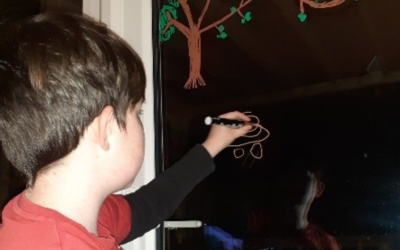Women and campaigning: grassroots activism
 Author:
Author:
Catriona Stewart is Writer-at-large for The Herald.
The final article in our series inspired by OU/BBC Scotland co-production The Women Who Changed Modern Scotland is by Catriona Stewart, journalist and Secretary of Women in Journalism Scotland.
She explores how women’s grassroots activism has thrived alongside juggling work, home and family.
Jill McNaughton looks at an old picture of herself in 2003, clutching a megaphone the way a child might hold a teddy bear or a new mother might hold her baby in the crook of an arm to show a curious neighbour.
Resting against her chest, that megaphone could be a comforter or a source of pride. It is both, it turns out.
 In The Women Who Changed Modern Scotland, Jill tells of how, two decades ago, she joined her fellow nursery nurses to protest against low pay and unfair conditions in local authority early years centres across the country.
In The Women Who Changed Modern Scotland, Jill tells of how, two decades ago, she joined her fellow nursery nurses to protest against low pay and unfair conditions in local authority early years centres across the country.
Hundreds of women walked out, forming picket lines in a challenge to their work being undervalued - literally and figuratively. At first, she was anxious, giggling with nerves into the loudhailer.
But then she found her voice: "By the end I loved that megaphone."
"It's amazing when you've got fire in your belly, what you can do," Jill's fellow campaigner Loraine Millar adds.
Amazing indeed, amazing in their strength, their determination and the way they exemplify the common thread running through the documentary series: ordinary women doing extraordinary things.
Grassroots activism from women who quite likely didn't consider themselves activists, or perhaps even feminists, has changed expectations and opportunities for those who come after them in so many arenas - the professional, the political, the personal.
They have campaigned for fair treatment for refugees, for the right to exercise bodily autonomy in peace, for equality at work, for safety in the home, for dignity in the law.
The women who do this campaigning work represent all spheres."
The women who do this campaigning work represent all spheres. They are teenagers and young women, mothers, middle aged women, elderly women, women of colour, disabled women, working class women, all using whatever means possible from the legal system and political pressure, to rolling up sleeves and doing the work themselves.
Inspirational, yes, but how exhausting. These women are all fighting for change as women working for women, often in their own time, often on a voluntary basis for no other reason than to right wrongs.
And the problems we are working to resolve are problems not of our own making.
In the late 1980s the idea of "the second shift" took hold due to a book of that name by the sociologist Arlie Hochschild. In families where a mother and father both worked, women put in a second shift of housework and childcare.
No matter how progressive the man of the house thought himself to be, he was almost never pulling his fair weight in the home.
There has been improvement in the decades since but extra labour still falls to women with the lexicon of domestic economics allowing scope for men to be let off the hook: fathers "babysit" their children; husbands "help" their wives.
This doesn't only happen in the home. It's been shown that in single sex groups, men will step up readily but in mixed sex groups men are far less likely to volunteer because they know women will do the work. Ditto in the workplace: women will organise leaving gifts and tidy office kitchens in a way male workers do not.
Women everywhere sigh and agree they don't need sociologists to tell them this.
Scotland is rich in female-led groups and organisations striving to make life easier for other women."
Yet what's less acknowledged is the third shift, that of our organised fights against structural inequality and our efforts to smooth the jagged edges of societal wrongs.
So much of the grassroots work in The Women Who Changed Modern Scotland continues; women still take on the extra labour of organising and volunteering, campaigning to protect or build on the achievements of previous generations.
Scotland is rich in female-led groups and organisations striving to make life easier for other women. These women aren't looking for recompense and rarely for praise - just better times.
Truly a woman's work is never done.
But while men enjoy the freedom of not having to fight for their rights and for equality, don't envy them too much. Women's collective efforts are enriching far beyond our material wins. In campaigning we gain, as only a small sample, community and solidarity, support networks, friendship and pseudo-family.
The work is its reward, but wider acknowledgement of these decades of work is long overdue.
The third and final episode of The Women Who Changed Modern Scotland will air at 10pm on BBC Scotland on Tuesday 7 March 2023. The entire series is also available to view on BBC iPlayer.
Visit OU Connect to access supporting content for the series. This includes blogs and two short films focussing on the barriers to and the benefits of women in politics.
Photo: Jill McNaughton and Loraine Millar in The Women Who Changed Modern Scotland ©TwoRiversMedia.
News
Media contacts
Media enquiries
OU in Scotland Media Relations:
Call 0131 549 7932
OU UK Press Office:
Call 01908 654316
Out-of-hours:
07901 515 891
Visit our OU UK news site

